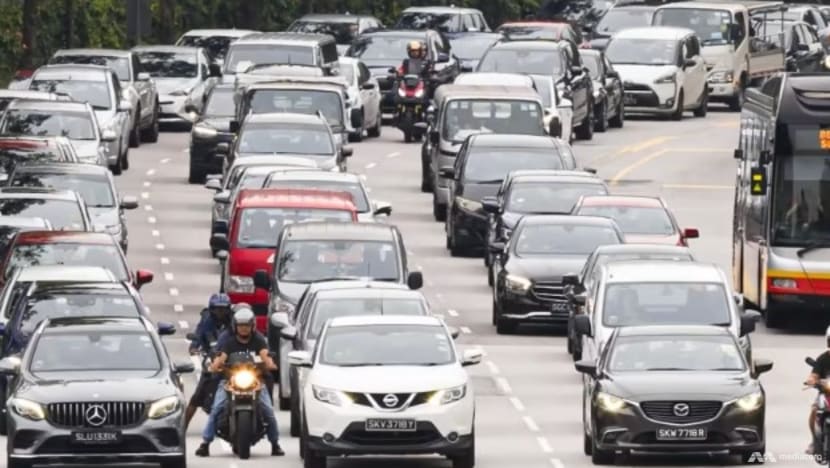Commentary: With COE prices at another record high, alternatives to car ownership make more sense
Alternatives to car ownership exist, but they will need support for long-term viability, says SUTD’s Dr Samuel Chng.

Cars on a road in Singapore. (Photo: TODAY/Leonard Leong)

This audio is generated by an AI tool.
SINGAPORE: Certificate of Entitlement (COE) premiums closed at yet another record on Wednesday (Sep 17), reaching nearly S$120,000 for smaller cars in Category A.
The amount may be eye-watering, but it’s no longer surprising. COE prices have increased to multi-year highs across several categories in recent bidding exercises, and market watchers expect little relief before the latter part of the decade.
With the cost of entry north of S$100,000 - not including the cost of the vehicle itself - it would not be unreasonable to say that car ownership is becoming increasingly difficult to justify, especially for those who only drive occasionally.
In this environment, alternatives such as car-sharing and leasing are receiving renewed attention, although they come with challenges of their own.
For example, BlueSG’s abrupt move to suspend operations has raised doubts about the long-term viability of car-sharing in Singapore. On CNA’s Deep Dive podcast, I noted that while there are roughly 7.5 million daily trips made on public transport, car-sharing accounts for only a fraction of mobility needs and will never replace mass-moving modes like MRTs and buses.
At the same time, however, reports that car-sharing firm Tribecar has taken over part of BlueSG’s fleet for a new electric vehicle rental service suggest that while some business models may falter, demand for flexible car access is still strong.
Separately, car-sharing platform GetGo rolled out a subscription-based rental service called ZipZap in July, offering plans ranging from as short as six months, with no upfront deposit required - a shorter commitment than typical long-term leasing services.
These developments point to a shift in how Singaporeans are approaching mobility.
Rather than viewing it as a binary choice between owning a car or depending entirely on public transport, commuters may be better served by having a spectrum of options.
Short-term and long-term car leasing, alongside car-sharing, can be mainstreamed to give households access to cars when needed, without the heavy burden of ownership. This, in turn, complements Singapore’s already strong public transport network and supports the government’s vision of a car-lite society.
CAR-SHARING AND LEASING AS A MAINSTREAM OPTION
Owning a car in Singapore has always come with a high price tag. Beyond the upfront purchase price and COE, drivers must also factor in additional registration fees, road tax, insurance premiums and parking charges.
But the cost is not only financial. Private cars take up valuable road and parking space in a land-scarce city, contributing to congestion and emissions. This is why Singapore has long sought to discourage excessive car ownership, investing heavily instead in a world-class public transport system.
There are approximately 1 million vehicles in Singapore, including roughly 650,000 cars. Many of these cars spend the bulk of the day parked when their owners are at work.
This suggests that for some drivers, car ownership may be more about flexibility than daily necessity. For example, families may want access to a car for weekend trips, errands involving bulky items, or to ferry their children or elderly parents around.
This is where car-sharing and car leasing come in. Both models reframe the idea of mobility as access rather than mobility as ownership.
Car-sharing offers mobility by the hour or day. Compared to a decade ago, there are now more car-sharing vehicles across neighbourhoods, integrated booking platforms, and electric vehicle (EV) options that align with Singapore’s sustainability targets. For individuals and families who only need a vehicle occasionally, this is the most cost-efficient option.
Leasing, on the other hand, gives drivers access to a vehicle for weeks or months at a time, without the 10-year COE lock-in. This appeals to those who want the stability of having a car parked at home, without the financial commitment of ownership.
THE ROLE OF POLICY SUPPORT
Despite growing interest, leasing and sharing options are not without drawbacks. Pricing can still be significant for regular users. And availability remains inconsistent across locations and time slots, particularly during weekends or holidays.
Some users have also raised concerns about cleanliness and the hassle of locating and returning cars at designated points.
These are issues that technology and operator coordination can help address over time.
But if shared mobility were to evolve into a mainstream alternative, the free market alone would not be sufficient to scale car-sharing and leasing sustainably in Singapore. Operators face high fixed costs in maintaining fleets, and usage tends to be uneven across time and locations. Without policy support, services may cluster only in profitable areas, leaving other areas underserved.
Here, the government can play a catalytic role. Parking allocation at accessible spots in transport nodes and residential estates would ensure equitable access. Incentives for electric vehicle adoption in shared and leased fleets would align with Singapore’s Green Plan. And integrating car-sharing into Mobility-as-a-Service platforms would allow commuters to plan and pay for journeys that combine trains, buses, cycling, taxi, ride-hailing and car-sharing seamlessly.
A public-private partnership approach - where the government sets broad conditions on affordability, coverage and sustainability, while operators bring innovation and service delivery - could offer the best of both worlds.
Can Singapore achieve a car-lite society without car-sharing?
In theory, yes. With trains, buses, walking, cycling, taxis and ride-hailing, most needs are already met. But without flexible car access, many households may still feel the need to own a car, undermining broader policy goals.
High COE prices highlight the unsustainability of car ownership as the default model. Instead of seeing this as a conundrum, we can see it as an opportunity to rethink how mobility should work in a dense, forward-looking city.
Singapore can achieve a car-lite yet mobility-rich future, where owning a car is no longer the benchmark of convenience, and where access, not ownership, defines the new social contract for mobility.
Dr Samuel Chng is Research Assistant Professor and heads the Urban Psychology Lab at the Lee Kuan Yew Centre for Innovative Cities, Singapore University of Technology and Design.

















